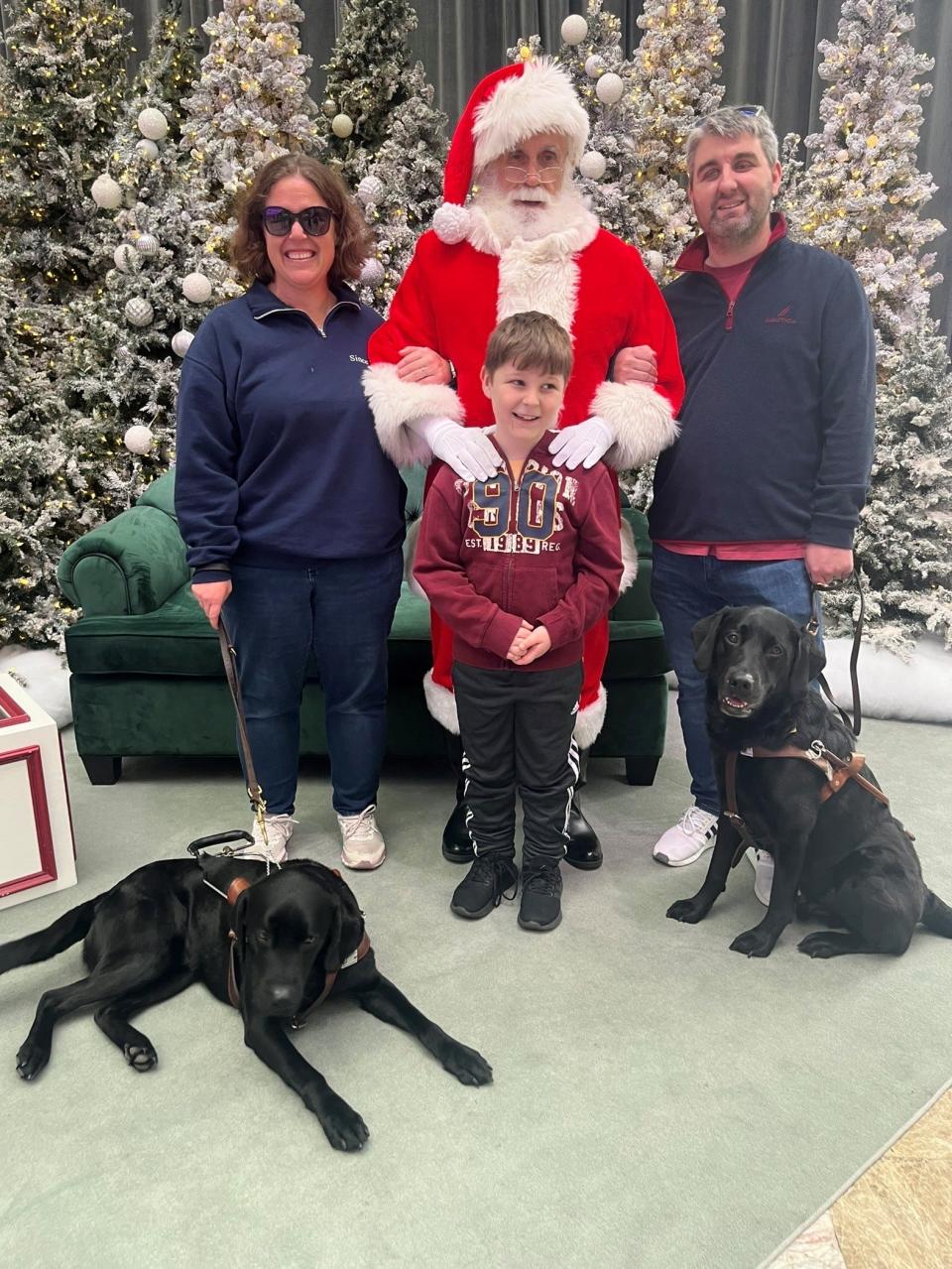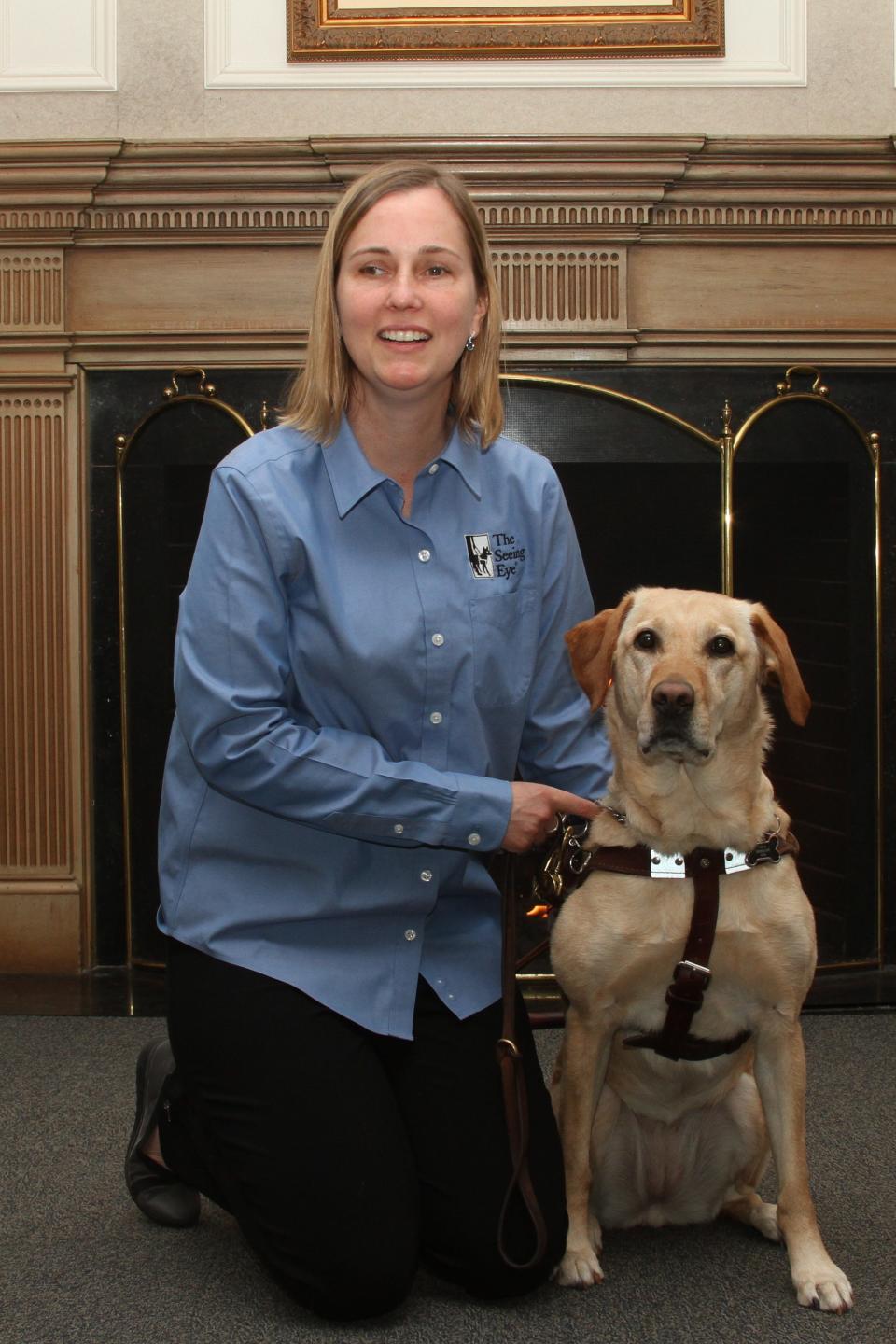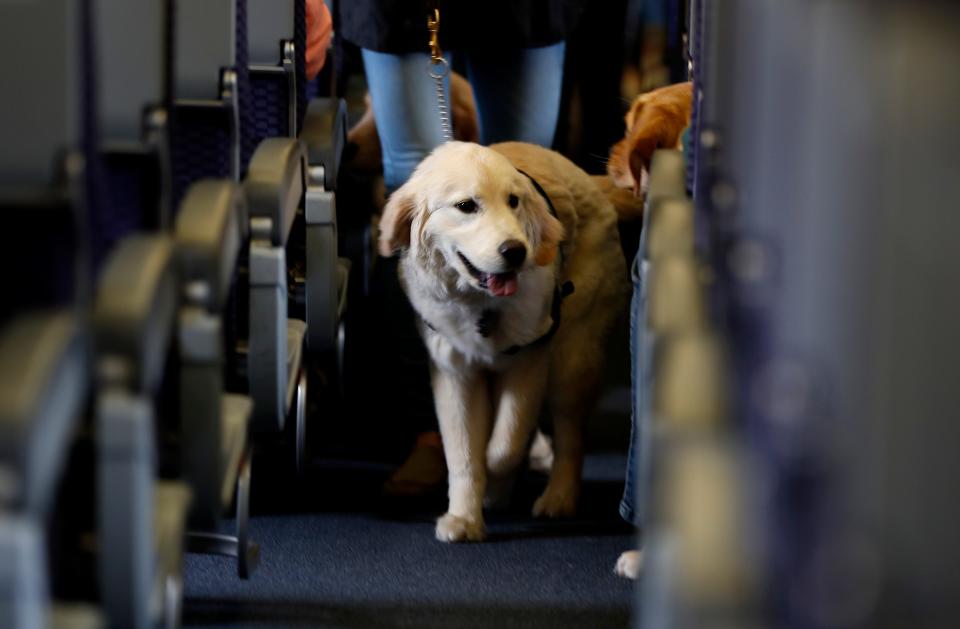'It's humiliating:' NJ's Seeing Eye pushes back as more businesses turn away service dogs
Like many Garden State families, Kyle Street and his wife, Sioban Leahy, love to summer at the Jersey Shore, booking hotel rooms as a base to roam beaches and boardwalks with their 8-year-old, James.
Yet for the Bayonne couple, it's a more complicated trip. Street and Leahy are blind, and much of their independence is tied to their guide dogs, each trained by the Morristown-based Seeing Eye.
It's an independence that is under threat. Like many who use service animals, the couple say they've seen a dramatic increase in venues − hotels, restaurants and, especially, rideshare providers − refusing to accommodate their dogs. The Seeing Eye, one of the nation's foremost trainers of guide dogs, says it's a problem across the country.

“We’re alarmed by the rising reports of access denials faced by service dog handlers, including from rideshare companies, airlines, businesses and restaurants," Seeing Eye CEO Margaret “Peggi” Howard said in an interview.
The nonprofit announced in January it had formed a department focused on raising awareness and support for guide-dog handlers.
Why guide dogs are denied
The denials are tied in part to the proliferation of animal companions on two fronts, Howard said. First, service dogs are increasingly used to address conditions beyond impaired vision, including epilepsy and diabetes.
At the same time, rising numbers are claiming service-dog rights for their emotional support animals, whose use is protected by law in the home but not in public transit, hotels or taxis, among other settings.
"I've been denied rideshares from Uber and Lyft a good 40 times in the past year, and that's lowballing it." said Street, 29, who works at an Apple store in Manhattan.
Street and Leahy are both veteran guide-dog handlers through their association with The Seeing Eye, a global leader in the industry since 1929.
Story continues below gallery.
"We actually met and got married at the Seeing Eye," Street said.
When he and his wife need to travel with their dogs, they are happy to pay for a larger rideshare vehicle, he said.
'Nothing is more frustrating'
"But even then, we are still more likely to get denials," Street added. "Nothing is more frustrating. We try really hard to make sure James doesn't see our disability as anything more than a minor inconvenience. When he has to witness that, it's heartbreaking."
"It's humiliating to have that experience," said attorney Melissa Allman, the Seeing Eye's new senior specialist of advocacy and government relations. Allman, who is blind and has a guide dog, Luna, to assist her, has her own horror stories about rideshare refusals.
Allman recalled her own attempt to take an Uber from her dentist to her work office. When the driver arrived, she could hear him telling a security guard he would only take the dog for an extra fee.
"He was told that was against the law," she said. "He said 'I don't care,' and drove away."

David Johnson, a former training director, was selected to lead The Seeing Eye's new initiative as director of accessibility, advocacy and government relations. He will work with Allman, who previously worked with the group's department of instruction and training.
She cited the words of Seeing Eye founder Dorothy Harrison Eustis: "'Your dog is not going to do you any good if you can't take her anywhere.' That's why we are here."
Service denials are not limited to rideshares, Street and Allman said.
Hotel horror stories for dog handlers
"We've had lots of issues in hotels up and down the Jersey Shore," Street said. One experience in Point Pleasant sticks in his mind.
"As soon as we got there, they told us we couldn't have dogs," Street recalled. "They scrambled when we explained they were service dogs. But as we left their office, they made it very obvious they needed to vacuum and clean up from whatever hair dander may have fallen during the two minutes we were in the office."
They checked out the next day. "And I still got a very nasty call from the owner that they've never seen so much hair and they were going to charge me an extra fee."
More: Can landlords bar emotional support animals? Not in NJ, attorney general says
Allman shared her own hotel horror story about a trip to Washington D.C., where she got a similar "runaround" from the manager of a boutique hotel who tried and failed to extract an extra fee.
Later that night, she was heading out to dinner with friends, only to have a driver deny access to her dog.
Uber, Lyft service animals settlement
Federal and state laws govern accessibility issues for service dogs in public and areas such as businesses and transportation.
Separately, Uber and Lyft agreed to settle a 2016 lawsuit brought against them by the National Federation of the Blind. The companies promised to revise training and accountability standards for drivers, who would accept "their responsibility to transport riders with service animals" under the guidelines of the Americans With Disabilities Act
Both companies now have extensive descriptions of their policies on their websites.
But Allman and the National Federation said that, following a three-year monitoring period that expired in 2020, anecdotal evidence and other reports indicate rideshare denials are rising again.

Emotional support animals: 'People are abusing the system'
Allman said much of the confusion surrounds the increased instances of emotional support animals during travel or trips to stores, restaurants and other public spaces. "People are abusing the system," she said.
"People claim their dog is an emotional support animal and they put a service animal vest on it. You can buy them on Amazon," she said. "Some people legitimately do not understand you can't just make a dog or a cat a service animal by putting a vest on them."
The Humane Society of the United States concurs: "The fact that the term 'service animal' is often used by landlords and public housing authorities to refer to both service dogs and assistance animals often creates confusion," the group states on its website.
While there are laws permitting emotional support or "assistance" animals in public housing, those rights do not extend to the level of trained service dogs.
"A service animal has to be a dog that is trained to perform a specific task," Allman explained. "It doesn't just mean the presence of this dog keeps me calm. It has to be trained to perform a task for the benefit of the person with a disability. A dog can be trained to alert me when I'm about to have a seizure, or when my blood sugar is low. It's all about recognition and response."
The Seeing Eye says its dogs are specially bred and trained to guide people who are blind. The philanthropy's students, and their dogs-in-training, are a frequent sight on the streets of downtown Morristown, but the group also conducts training in other public locations, including a recent visit to Newark Liberty Airport.
More: Blind voters say they're still disenfranchised in NJ. But a new bill has given them hope
Guide dogs and rideshares
Asked about service-dog denials, Lyft responded with a statement confirming it "has a strict service animal policy that requires all drivers to accommodate passengers traveling with service animals, and we take any allegation of this nature very seriously. There is no place for any form of discrimination on our platform and we ask that riders report issues immediately."
Uber did not respond to email requests for comment.
Street said that while the rideshare leaders responded to complaints with more detailed reports of driver investigations and discipline during the three-year settlement monitoring period, they now respond with "a general response of what they expect from their drivers, with no real understanding of what happens after that."
"We're going to continue to work with law enforcement in New Jersey and beyond," Allman said. "We're going to be working with members of Congress to remove some of the access barriers to air transportation."
What to do if your dog is denied
Meanwhile, she advises guide dog handlers to report service denials to the businesses that provided them with their animals.
"We are also encouraging people to file complaints with the Department of Justice," she said. "It's very important that we establish for DOJ that there is a pattern and practice that is pretty pervasive of denying people with service animals access to rideshares."
William Westhoven is a local reporter for DailyRecord.com. For unlimited access to the most important news from your local community, please subscribe or activate your digital account today.
Email: wwesthoven@dailyrecord.com Twitter: @wwesthoven
This article originally appeared on Morristown Daily Record: NJ Seeing Eye fighting back as more businesses deny service animals

